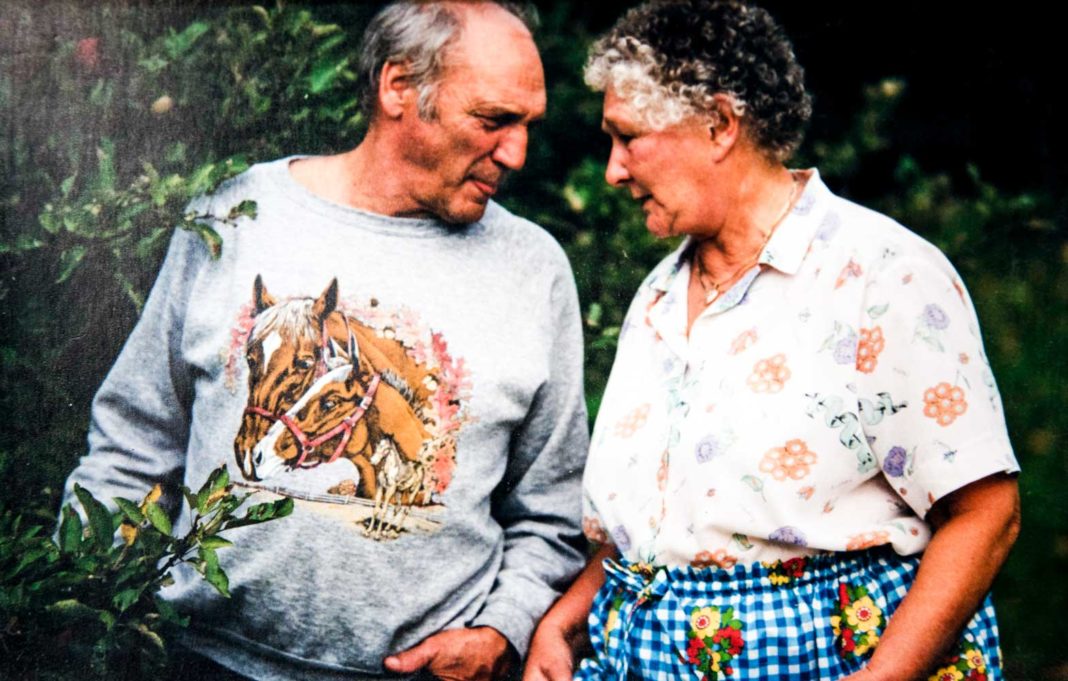Gerald (Jerry) Kitts
Jerry Kitts has always had a passion for racehorses. “I learned from my dad William, who at 18 stole his father’s piano, traded it for a car and then exchanged that car for a racehorse named Playabit.” Jerry was a jockey for his dad for many years and won a good number of races at tracks all over Ontario. He also delivered bread with a horse and wagon and he helped build CF100s and the AVRO Arrow. Jerry joined the army for three years then, after several jobs, found Reimer Express and became a transport driver with destinations across Canada and the USA. Jerry lives on Manitoulin now. He is in his 90s but when you meet him, he seems years younger.
“Maternal grandfather was Herbert Ward. His last wife, the one I remember, was Edith. Grandfather worked in maintenance, mostly with boilers in Montreal churches. His father had served in the military, stationed in India. He became a wandering soul for many years and not much was shared about him.”
Parents are William and Henrietta (Ward) Kitts. They met in Montreal at the Old Blue Bonnet racetrack and married in Toronto. “Mum was a waitress and she was quite young when I was born years earlier, before she met William. At this time, many single girls like her went to a special home for unwed mothers. Babies born to these single mums in the pre-war and war years were often not shown to their mothers but were adopted by other families.”
“My mother was determined to keep me. She left me with grandfather Ward, then sent for me when I was three. My grandad put me on a bus. The driver and several passengers helped take care of me when I got car-sick on the way to Toronto. Mother was there at the bus stop. I remember going to Grade 1 at Alexander Muir School in Parkdale, Toronto. One day, my mother happened to walk by the school. She saw a big fight involving several children. She stopped, and to her dismay, saw that I was in the middle, fighting with the other children.”
“I was a bit unlucky in my early years. Curious, I put my hand into the door frame of an old-fashioned car and closed the door with my fingers on the frame. I struggled to get free until help finally arrived. Soon after, Dad bought me a bike. I was mesmerized by the spinning spokes on the wheel and cut my face rather badly. It all healed in time.”
“We moved a lot in Toronto. May 1 was an annual moving day at that time. Torontonians relocated their households.” Jerry went to several schools and discovered that he was not overly fond of scholastic pursuits. “I tolerated most lessons, but liked geography, history and spelling. I was lousy at math. My favourite sport has always been baseball.”
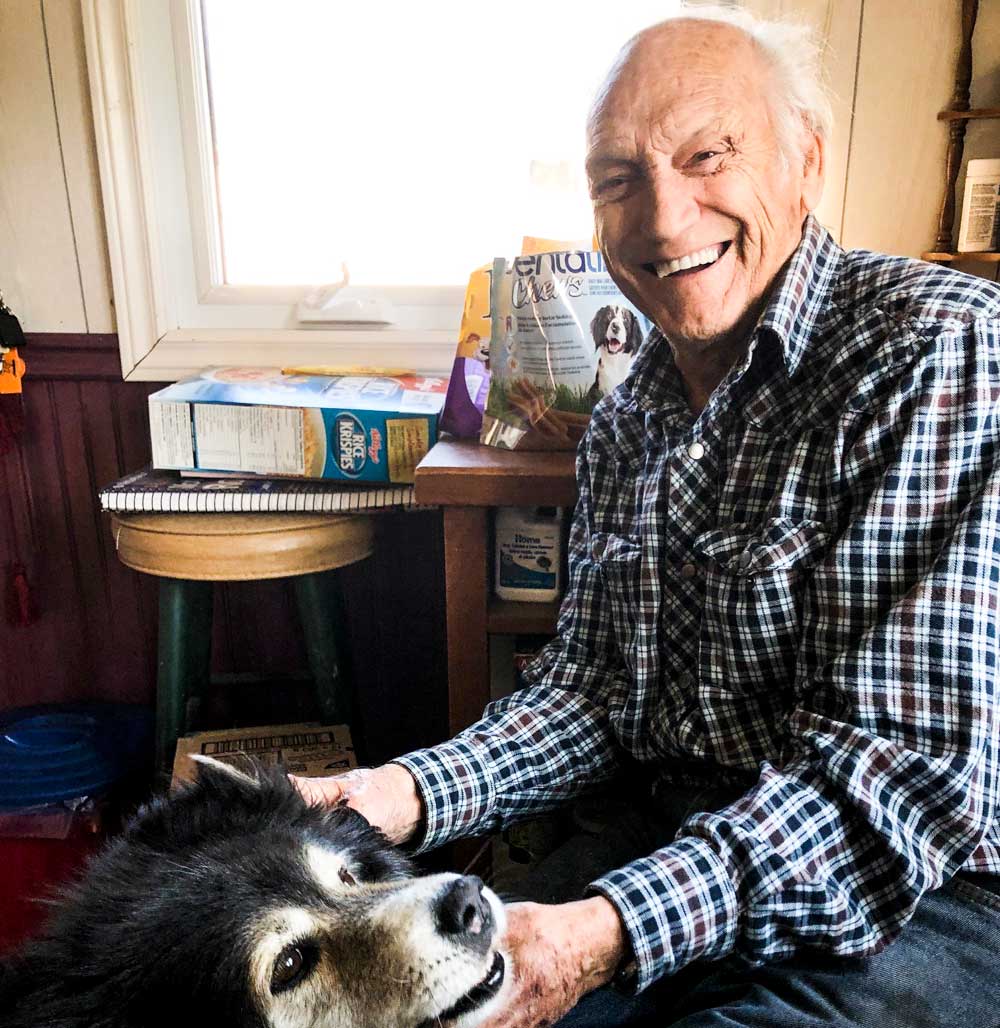
When Jerry attended Brock Avenue School, people thought he was malnourished. “I was small for my age and exceptionally light, a genetic predisposition. People were always trying to fatten me up. Teachers gave me and a couple of other students a pint of chocolate milk each day. I really didn’t want to convince them that this was a normal weight for me.” Sister Barbara was born when Jerry was eight. At 14, after school and weekends, Jerry was a helper at Humber Engineering, just west of Toronto. They built the tail section for the Mosquito fighter/bomber and Jerry helped the technicians by fetching tools for them.
“My dad loved the racing business and he owned a stable called Playabit Stables, named after his first competing horse. Jockey shirts were red and white with a red ‘P’ on the back, a bit like the Canada flag which came along later. Dad would be away from spring to fall, racing at various tracks including Woodbine in Toronto, Connaught Park in Ottawa, Blue Bonnet in Montreal and the Fort Erie Racetrack.
“When I was 16, I weighed 88 lbs and was 5’1” in height. One day dad said to me, ‘you are a jockey.’ That had a profound effect on me. I had finished Grade 9 and would now be immersed in that exciting world too. Dad took me to the track and put me on a big black horse called Open Season. I was shown how to guide a thoroughbred racehorse in a circle, at the end of a long rope at the Long Branch Racetrack in Etobicoke, aware that training a valuable racehorse was an important task.”
“Dad told me to take Open Season down to the far side of the racetrack, by the fence. I followed orders and then turned to come back. Open Season had other ideas and decided to return to his stall at break-neck speed, jumping over a manure pile with great agility; I hit the ground, but thankfully, missed the manure pile.”
Banff and Timely Flight were just two of the many horses Jerry exercised and rode as he honed his jockey skills. Jerry started riding in 1946. He was barely a teenager when he ‘broke his maiden’ riding on Goldsworthy, his first winner that year in Connaught Park. “It was a regular race, not a handicap, with 12 horses running a three-quarter mile. Goldsworthy ran well. It wasn’t a clear exit from the gate, and we were in fourth position at the one-quarter pole. I bent down to his ear and said, ‘Com’on Big Red, let’s go, let’s show them what we can do.’ Red did his best and we arrived at the finish line in first place by a nose.”
“It seems that my dad had wanted me to wait a while before winning. Being victorious in a race early in my career was a bit of a handicap. You could ride up to 40 winning horses or ride for a year as a novice, but once you win 40 races, you lose that allowance. To keep the races fair, weight is also a criterion. The horses with better records could carry more weight. For an apprentice, there was an allowance for an eight-pound difference. If a weight of 120 lbs was allowed for the jockey on a specific horse, then an apprentice could ride if he weighed 112 pounds. I was no longer an apprentice at the end of 1946.”
“A handicap is measured against the success or value of the horse. The better racer he is, the more weight he is assigned so that the playing field is more equal for all the horses. Most three-year-olds perform better on a short run. The racing saddle weighs only one and one-quarter pounds. A difference of eight pounds makes a huge difference. The limit of weight for the jockey is about 114 pounds. A horse could carry an extra five pounds to 119 lbs. If the jockey’s weight were below 114 pounds, weights would be added. Crossing the line first with a handicapped horse gives the winner a bigger purse.”
“Each horse is considered to be capable of running the handicapped races. Ages and weights are carefully recorded and monitored on their records. A winning horse may get a weight of 110 lbs but a novice horse with no record might get 106 lbs and that four pounds can make a significant difference in the outcome of the race. Average purses were $800 for a race; handicapped race purses ranged from $1,000 to $1,200.”
“At the end of the season, in 1947, dad had sent me with a couple of horses, to Topsfield, Massachusetts. I was an owner-trainer because I wasn’t licenced to ride in America. I ran the horses at three or four tracks. A kind man living in Topsfield left a good legacy. Just after the war, he was aware of many starving men on the streets. He had a sign outside his restaurant that left a deep impression on me, ‘Let no hungry man pass this door.’ He never turned away anyone that was down and out. He offered to pay for my meal, but I told him I would pay.”
After a few more stops, Jerry sold the horses and headed for Boston for a holiday. “On my way back home, I stopped at a highway café. Two burly cops sat down beside me. They were quite friendly. I noticed the big revolver in the holster and was brave enough to ask about it. The policeman said, ‘Would you like to see it?’ ‘Yes,’ I said too quickly. He took the loaded 38-caliber revolver out of his holster and put it on the small table in front of him. I nearly fell over. He seemed to sense that I was trustworthy. I admired the gun and subsequently saw it returned to the holster.”
Racing continued to be in his blood. Quebec had their own King’s Plate and Jerry finished second in 1948. “That was super special. I lost by just a zip, a nose.” In 1949, his last year as a jockey, he rode for owner Jim Fair. “All his horses had names that included the word ‘mark.’ He had me on Rockmark. I won a couple of three-quarter mile races for him at Blue Bonnet in Montreal and in Toronto. Rockmark was not used to a long race. Toronto’s track was a mile and one-eighth. He was a good handicap racer in the shorter runs. I had to convince him to win. Coming down to pole 16, we were ahead, but then he slowed down just a bit and a long distance horse beat him by a head.” Jerry was a jockey from 1945 to 1950. That fall, Jerry was 5’5” and weighed 112 pounds.
By 1951, because of his increasing weight, he gave up his jockey licence for a driver’s licence. “I got a job at Brown’s Bread driving a horse and wagon. The horse knew the route better than I did. He stopped at all the right places and I just delivered the bread. He always waited for me to come back. Unfortunately, I spent too much time sampling donuts and cakes and playing pinball. When I left, I owed them money.”
Jerry worked at various places over the next five years, including Admiral, in Mississauga. They made radios and motor parts. His next big job was with AV Roe (later AVRO) in Malton, at the west end of Toronto. Special training wasn’t needed. “We all had a small part in the assembly process building the CF100 and the controversial 105 Avro Arrow with the Iroquois engine. It was designed to be a super plane, flying at 2,000 mph.”
In the early 1960s, then Prime Minister Diefenbaker allegedly arranged something with the USA which wanted their aerospace industry to be dominant. The superior AVRO Arrow was scrapped. The company had made up to 400 of the CF100s but only six of the 105 AVRO Arrows. Four were on the runway, one was nearing completion and one was part way through the construction phase. All were destroyed. “I was out of a job and I wound up in the army for the next three years.”
About this time, Jerry met his first wife on the train platform in Kingston. Adele and her mother were heading to Vancouver. “I helped them with their luggage and managed to get her address. Jerry and Adele got together after she returned from the west. In time, the couple decided to marry. It was Easter weekend of 1959 and I was getting cold feet. I thought about jumping out the bathroom window, but I saw her arriving and I stayed.” They married and had two girls, Robin and Cheryl.
After the army stint, in the early 1960s Jerry drove a delivery truck for Canadian Pacific Railways and was also employed at a service station. His supervisor was difficult to deal with. “One morning after he put me down, I got angry and left.” His next job produced even more challenges. Continental Can was a new company dealing with food containers. “I was on a platform in midair. I had to pick up cartons and put them on a conveyor belt while balancing up high. Nobody was coming to relieve me for breaks. When I was called to the phone, Adele told me that Reimer Express had called and wanted me to work. I left and didn’t look back.” Jerry and Adele went their separate ways a few years later.
Jerry met his second wife Dorothy, from Durham, at the Toronto Airport in 1977. In time the two were wed. “I was still working at Reimer Express where I stayed close to 32 years, driving over a million miles to destinations all over Canada and the USA. The management was good. They trusted me and I worked hard for this company until I retired in 1993.”
“In 1988, my rig, loaded with barrels of nickel slugs, was in an accident. I was on the Queen Elizabeth Way near the Guelph Line exit when a Russian tourist cut me off. The truck rolled over twice and wound up in the ditch, leaving a severely damaged truck and nickel everywhere. Three or four transports stopped to help. I climbed through the broken windshield and sat in one of the other trucks. A bakery truck driver had stopped, and he got the licence number of the Russian tourist and gave it to the police. The police caught him at the border. It was an expensive accident.”

Jerry with his trainer, the horse’s owner and his valet sitting for a winning pose. 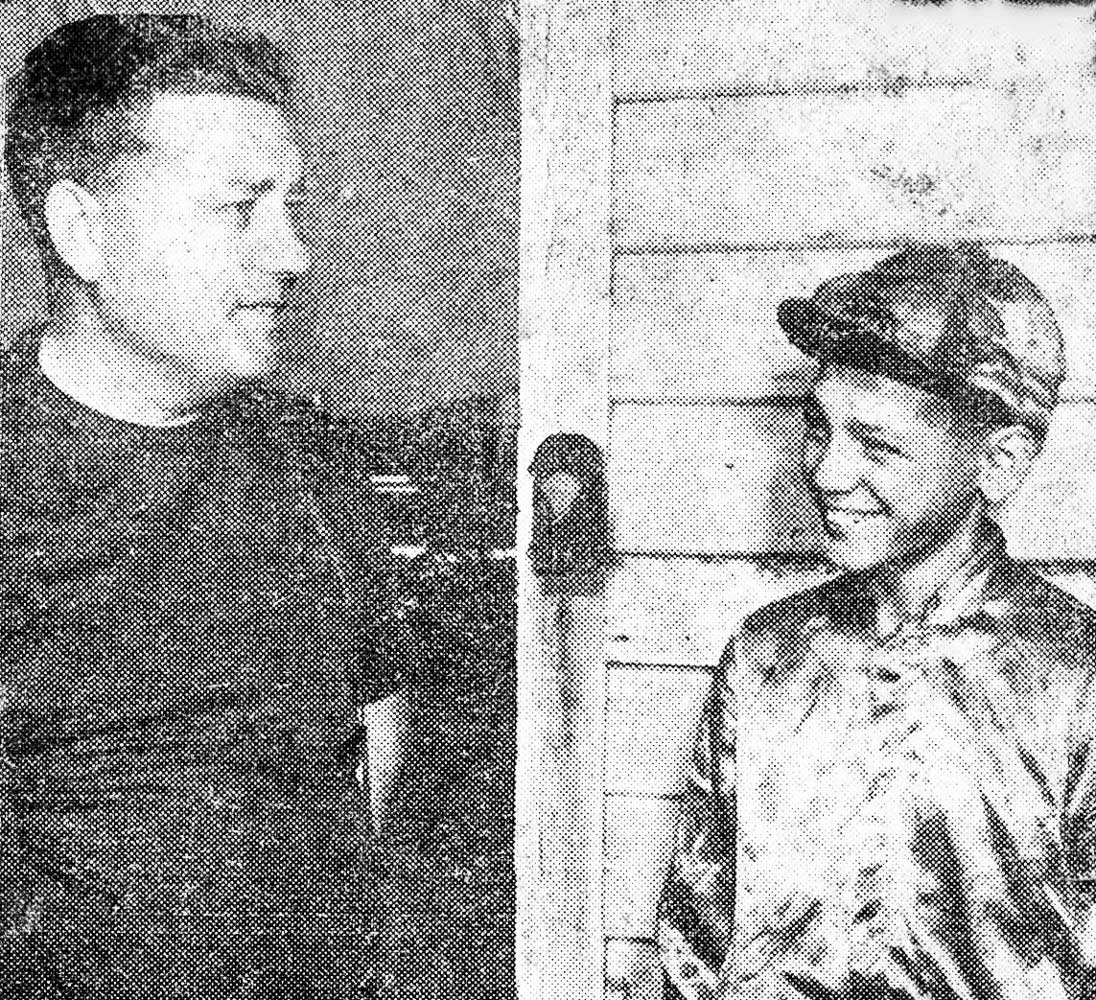
Jerry with his dad at the Long Branch racetrack. 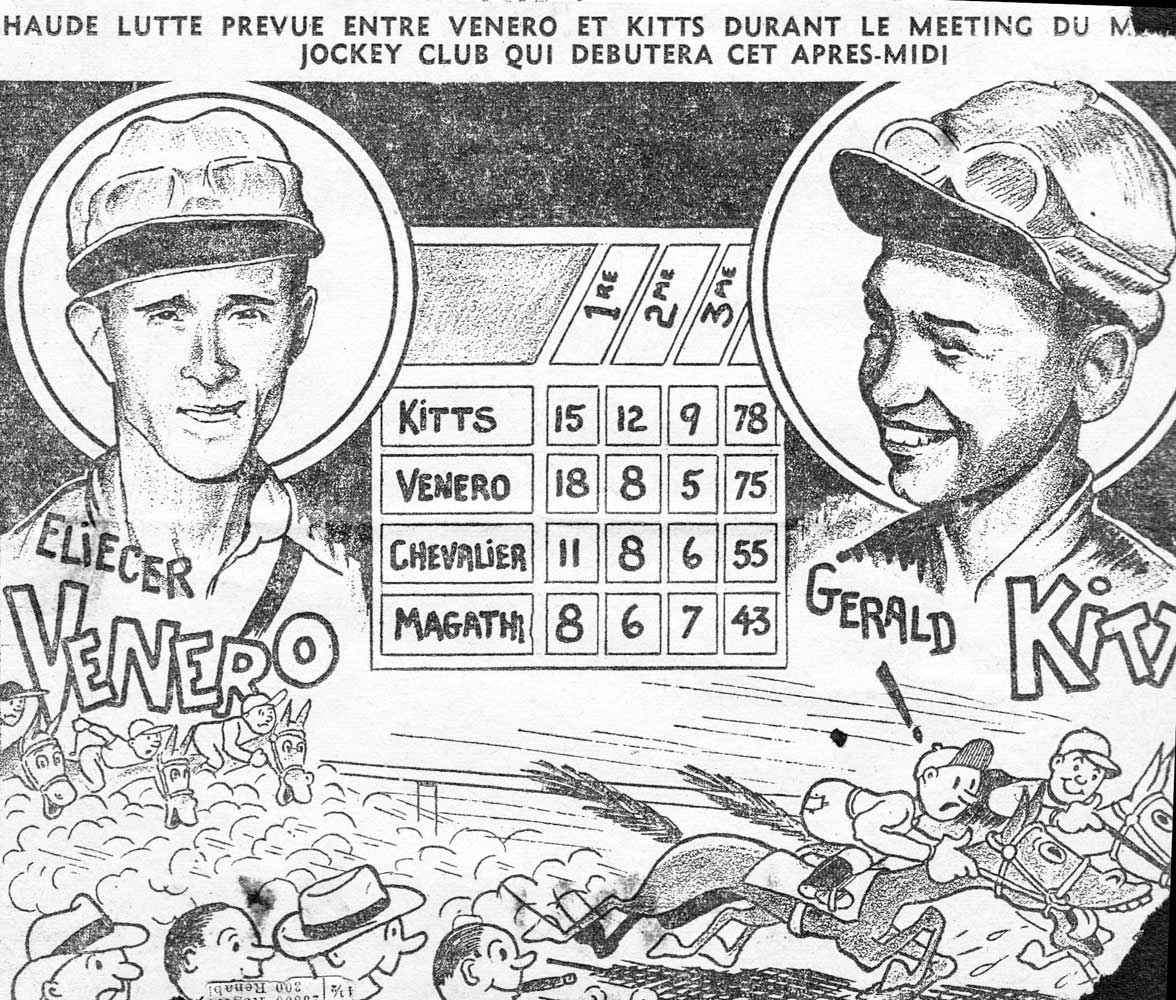
A Montreal cartoon featuring Jerry and his nearest rival. 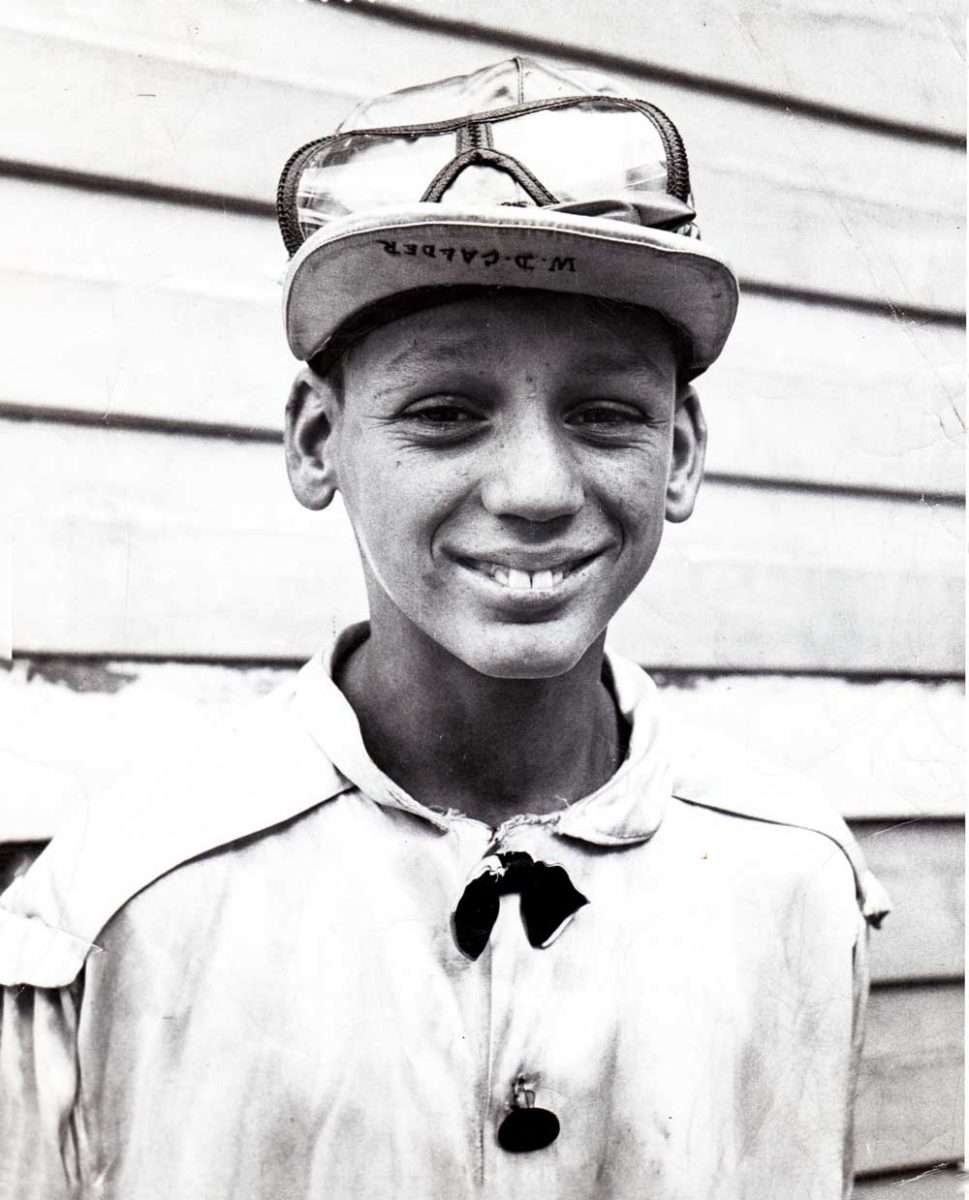
Jerry at 16 or 17. 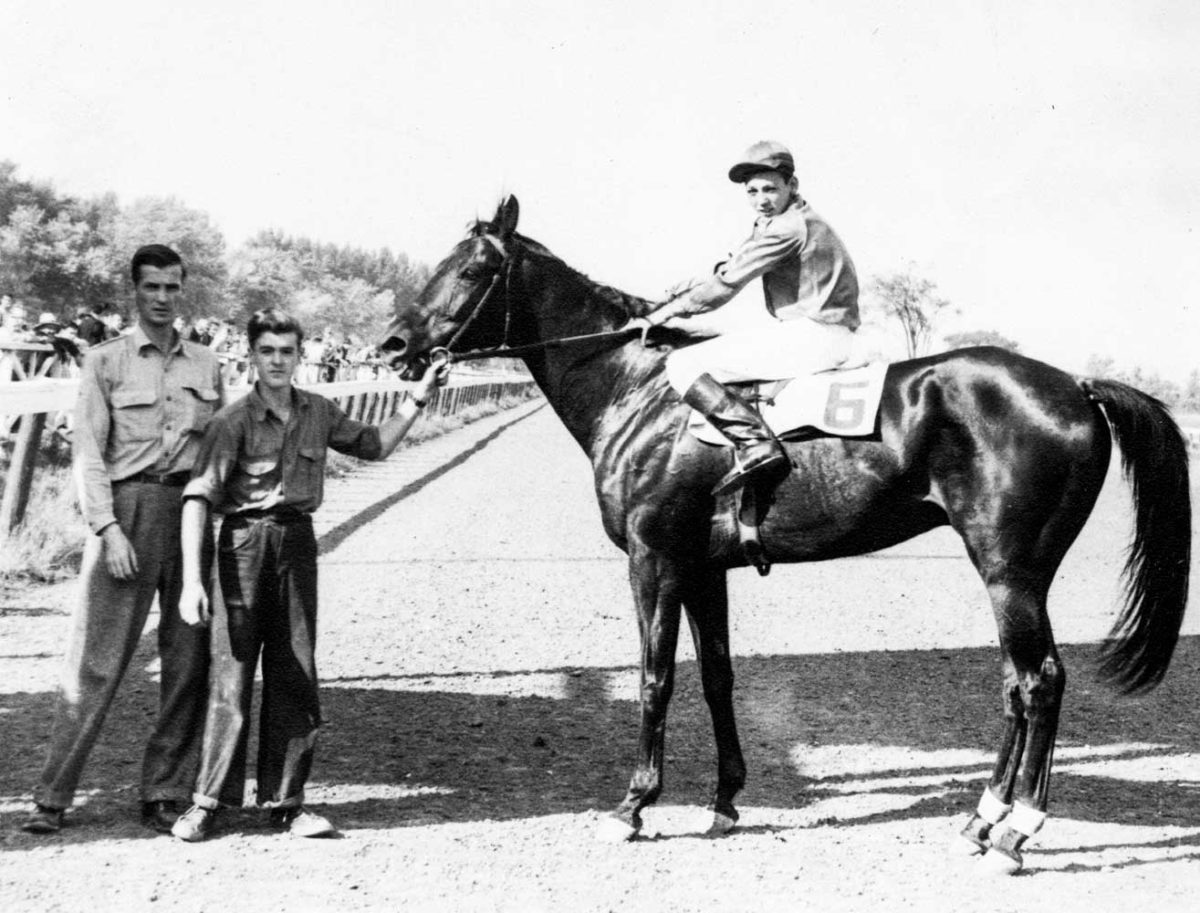
In the winner’s circle wih his valet and trainer.
“I was driving a load of material from Sherret Gordon to the Eldorado nuclear plant in Blind River when I got rerouted to Port Hope where I was asked to call home. I was upset to find out my dad had died. They unloaded my trailer of radioactive material. It had taken me 30 hours, including a few rest stops, to get to Port Hope from Saskatchewan. Now I would drive the cab another two to three hours to Toronto. I was so tired I nodded off. Suddenly I was startled awake with an adrenaline rush when I heard, ‘Wake up Jerry.’ I swear to this day, it was my dad who woke me up and avoided that crash.”
“Dorothy had a restaurant, The Crystal Chandelier, north of Durham, on Hwy 6. It included a bar and a 25-seat dining room. It was profitable, but eventually, too much work. I was driving and coming home weekends. One day I was home, playing golf. When I walked in the door, Dorothy said, ‘Guess what? I sold the house. We have 90 days to get out. I found a place in Paisley’.” They moved to Paisley and stayed seven years. Then, the same thing happened. Dorothy sold the place and this time they had only 28 days to get out.
“We still had our place in Florida that we had been visiting each winter for the last 10 years, but this time we were heading to Manitoulin. We checked the computer for listings on the Island. We found one in the M’Chigeeng area. It looked interesting and the price was reasonable. ‘Let’s check it out.’”
“It was beautiful! It overlooked the lake. We bought it in 1999 and moved. Two years later we arrived by ferry and decided we needed a trip to Espanola for groceries the next day. When we got back to the house, we stood in stunned silence as our house was burning to the ground. We relocated temporarily, then bought a house in Manitowaning.”
“I lost Dorothy on September 24, 2018. She had been very sick. I was proud that I had kept her at home and took care of her to the end. My health was still rather good. I had quit smoking. I used to smoke three packs a day at the height of my 45-year smoking career, starting at age 13. The day a vigorous cough started, I quit right away and threw my last pack into the wastebasket. My father had died of emphysema.”
Jerry shared that he was quite sick with polymyalgia rheumatica for a while. He was living on Manitoulin and lost a lot of weight. “I was in pain and couldn’t get up or dress myself. I was so discouraged. My body was wasting away. Dr. Spruit put me on prednisone and within three days I was without pain. I had three months to slowly wean myself off the prednisone at the end of the treatment cycle.”
“Favourite activities? Classical music, especially Andre Rieu. I like to watch British videos on YouTube. The beautiful death song in Madam Butterfly is amazing. Mozart is a favourite.”
“Favourite shows? Britain’s Got Talent and America’s Got Talent. Strengths? Driving trucks and riding horses. One year there were 42 wins with thoroughbreds. What do I still want to do? Go to Holland to see a live concert by Andre Rieu in Maastricht. I know that would be incredibly special. I also want to live to be 105. Anything I would have changed if I could go back in time? I would have joined the RCAF and likely stayed until retirement. Travelling? Recently I travelled to England to see some of our ancestral homes but now I like to stick to home base.”
“Favourite stop on Manitoulin? Michael’s Bay hosted our favourite restaurant here. The chef was great. Both Dorothy and I loved the food. This Island is good for my border collie-husky mix, Julie, too. I can drive her to a side road and let her run. This Island also has the licenced, well-equipped and well-run Manitoulin Amateur Radio Club. It’s possible to talk to astronauts. I don’t have much equipment, but I can talk to anyone in the world. Alan Boyd, retired OPP, and Rusty Auxier, who fixes computers, are members. This place is home for me now. I enjoy the beauty and the worthy people who live here. It’s all good.”

